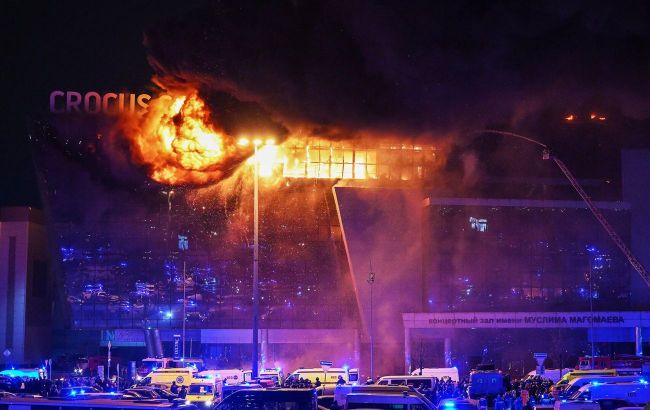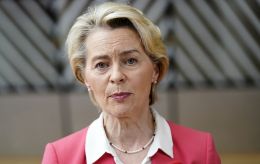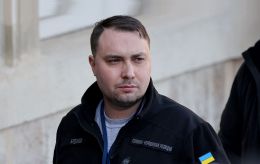Kremlin struggles to identify Ukrainian involvement in terrorist attack in Moscow region
 Russian elites cannot express a common position on the terrorist attack in the Moscow region (photo: Russian media)
Russian elites cannot express a common position on the terrorist attack in the Moscow region (photo: Russian media)
Russian dictator Vladimir Putin and other high-ranking officials are taking an inconsistent position regarding the narrative that Ukraine allegedly carried out a terrorist attack at the Crocus City Hall. This indicates that the Kremlin has not yet developed a consistent line on discussing the incident due to the shock felt by the Russian elite after its consequences, according to a report by the Institute for the Study of War (ISW).
It is noted that Putin and other high-ranking Russian officials are trying to maintain a consistent rhetorical line regarding the attack on the Crocus City Hall in the Moscow region. This indicates that the Kremlin has not fully understood how to reconcile its information operations with the reality of intelligence and law enforcement failures.
Additionally, the report states that Putin and other officials have not fully rallied around the fake narrative that Ukraine supposedly organized and carried out an attack on the Crocus concert hall on March 22, for which the Islamic State claimed responsibility.
"Putin addressed the Russian Federation on March 23 following the March 22 Crocus City Hall terror attack and claimed that the attackers had contacts who had prepared a window for their exfiltration across the border into Ukraine, a claim for which there is no evidence that has become central to the Kremlin’s baseless accusations that Ukraine was involved in or responsible for the attack," the Institute for the Study of War noted.
The report reminded us that Putin mentioned the Ukrainian government only once during an unrelated part of the address about the return of Russia's lost property abroad. This is a noticeable change compared to his address on March 25, in which he claimed that Ukraine was the mastermind behind the attack and his accusation on March 23 that the attackers fled to Ukraine.
Kremlin spokesman Dmitry Peskov also refused to directly state that Ukraine organized the attack on Crocus in response to journalists' questions about how Russia would react if Ukraine's involvement was confirmed.
"Putin’s oscillation between blaming Ukraine outright one day and then avoiding the issue the following day suggests that the Kremlin has not yet established a templated line on how to discuss the attack, likely partially as a result of the shock felt by the Russian elite in its aftermath," the ISW report said.
Other Russian high-ranking officials have doubled down on the Kremlin's unfounded narrative accusing Ukraine of the attack. However, they have acknowledged that the Russian government currently lacks critically important information about the attack, contradicting their statements and those of other Kremlin officials.
For example, the head of the Federal Security Service of Russia, Alexander Bortnikov, accused the Security Service of Ukraine of attacking with the involvement of the US and the UK supposedly to cause panic in Russian society - a long-standing narrative of the Kremlin that tries to portray the war in Ukraine as an existential war against the collective West. However, later, the FSB chief stated that Russia had not yet identified the mastermind behind the attack.
Bortnikov also emphasized that Russian special services took all possible measures to prevent the attackers from crossing into Ukrainian territory, echoing Putin's statement from March 23 but contrasting with Lukashenko's statements from March 26.
Meanwhile, according to the report, Secretary of the Security Council of Russia, Nikolai Patrushev, on March 26 responded to press inquiries about who carried out the attack - the Islamic State (IS) or Ukraine - by saying, "Of course, Ukraine."
"Then later doubled down on this narrative by claiming many things point to Ukraine’s involvement while appearing on Russian state television channel Rossiya-1 and suggested that Russian special services and law enforcement agencies will eventually reach this conclusion," the ISW report said.
Terrorist attack in the Moscow region
On the evening of Friday, March 22, in the city of Krasnogorsk near Moscow, several armed men opened fire in the Crocus City Hall concert hall. According to the latest reports, at least 120 people were killed in the attack.
The Islamic State group claimed responsibility for the terrorist attack. The US confirmed this information and denied any involvement by Ukraine in the events.
After the attack, Russian dictator Putin claimed that the terrorists allegedly intended to escape to Ukraine, and a window was prepared for them at the border.
However, Belarusian dictator Alexander Lukashenko broke this version and stated that the criminals were fleeing towards Bryansk, near the border with Belarus.

